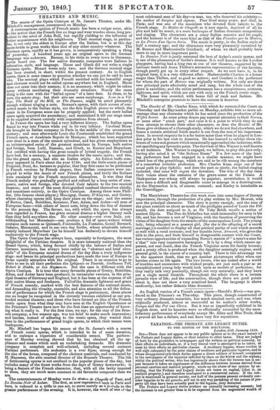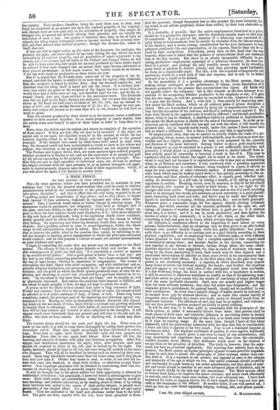TAXATION—THE PROBATE AND LEGACY DUTIES.
TO THE EDITOR OF THE SPECTATOR.
London,16th January 1849. SIR—There does not appear to be any public opinion as to the exact nature of the Probate and Legacy duties, or their relation to other taxes. They are judged of, both by the grumblers in newspapers and the writers on political economy, by their effects on individuals, or, if a very liberal view is attempted to be taken, at most by their effects on particular classes. A residuary legatee, whose residue is well nigh exhausted by the prior claims of creditors and particular legatees, and to whose disappointed eyes these duties appear a direct robbery of himself, complains in the newspapers of the injustice inflicted by them on the widow and the orphan; whilst the political writer, who has ingeniously shown that the Income-tax is un- just because it takes no cognizance of the difference between income derived from personal exertion and realized property, winds up his abuse of our system by as- serting, that the Probate and Legacy duties are taxes on capital, (that is, on realized property,) and therefore unadapted to a commercial nation. If the sub- ject is mentioned in general society, one half of the persons present evidently con- sider legacies to be Bei generis, and not in any way partaking of the nature of pro- perty till they have been actually paid to the legatee, duty deducted.
The Probate and Legacy duties produce an annually increasing amount; but the increase is not greater than is to be expected from the augmented wealth of the country. Their produce, therefore, being the same from year to year, may fairly be considered as an annual tax upon the realized property of the country; and, though they are now paid only on the devolution of property, they might be changed into an annual tax without altering their pressure, and are clearly the equivalent of such a tax. Our system of taxation, then, does, as far at least as regards the thing taxed, distinguish between income derived from personal exer- tion and that derived from realized property; though the Income-tax, taken by itself, does not. If any one will at night reckon up the value of the furniture, the carriages, the pictures, the plate, and other objects he has seen during the day, which are most undoubtedly all realized property, and all productive of much enjoyment to the owners, but of no income, and all liable to the Probate and Legacy duties, he will be able to form some idea how much the amount produced by these duties would be reduced if they were changed into an annual duty upon income calculated at their present percentage; or how much heavier the burden would be on income, if the tax were made as productive as these duties are now. But it is urged that the Probate-duty comes out of the property of the de- ceased, and that the legatee is entitled to no more than his legacy, duty deducted; that the recipient is taxed by neither duty; that the deceased cannot be; and therefore that the thing itself is taxed and not the owner. It is evident, how- ever, that either the giver or the recipient of the legacy has less money than he would have had if there were no tax, and therefore pays the tax; and as the de- ceased clearly does not, those entitled to his succession must. The dividends now due are paid at the Bank, Income-tax deducted; but the man who today re- ceives at the Bank his half-year's dividend of 48L 10s. 10d., has an annual in- come of 1001, and pays annual Income-tax of 21. 18s. 4d.; though he very pro- bably will reckon his income at no more than 971. Is. 8d, because he will have no snore to spend.
That the amount produced by these duties is on the increase, seems a sufficient answer to their asserted imeolicy: for so much property is yearly wasted, that the nation must save largely in spite of these taxes 311 order to keep them to a level.
Have, then, the widow and the orphan just reason to complain of the operation of these taxes? If they are rich, why are they to be excused ? if the taxes are unjust only to the poor, the objection must be to the amount at which the tax becomes payable,—that is, to one of detail, and not applicable to the general principle. If the amount now raised by these taxes were raised in some other way, the deceased could not have accumulated so much to leave to his widow and man; who therefore, as far as principle is concerned, are not unjustly treated.
-The Probate and Legacy duties, then, are taxes assessed upon realized property Whether productive of income or not, and are the equivalent of an annual tax paid by the person succeeding to the property., and are not unjust in principle. Whe- ther they are just in their operation on individual eases, are devised to produce the largest revenues with the lost pressure, or, as at present managed, are appli- cable to landed property, depends upon the detail of their organization; which, if
you will allow me space,I will discuss in another letter. X.



























 Previous page
Previous page